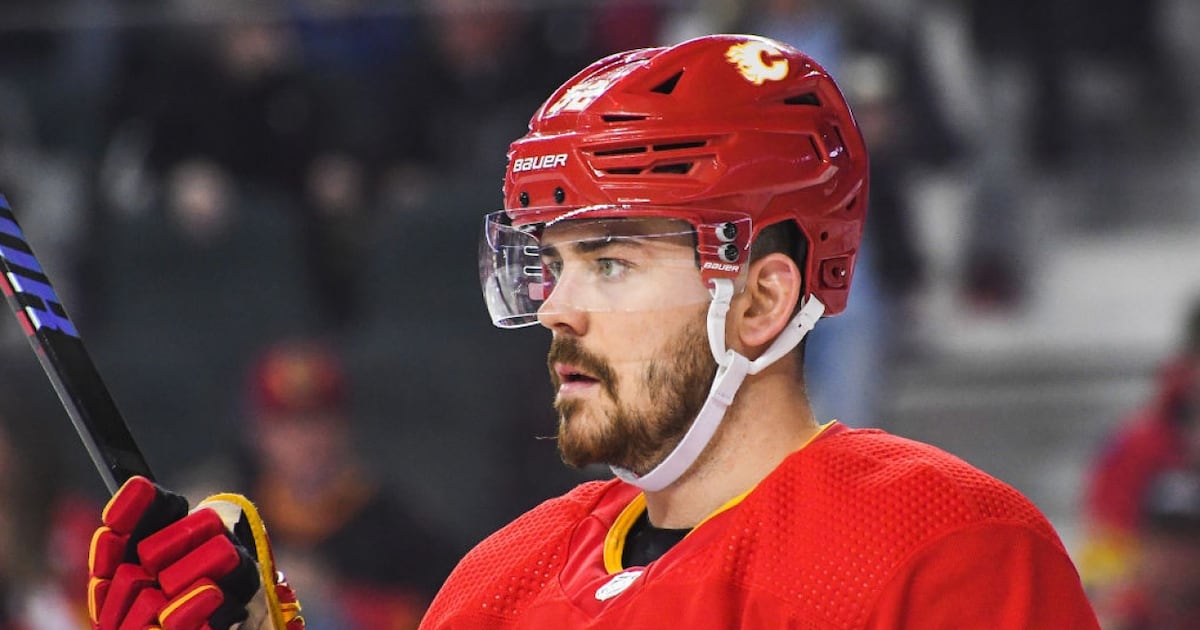Already four seasons into his Calgary Flames tenure, veteran blueliner and Team Canada Olympic hopeful MacKenzie Weegar still smirks when asked about the modest external expectations that seem to be set every season for the team.
“It bugs me for about a minute,” he said this week as the Flames opened training camp at the Saddledome.
“I don’t mind seeing that kind of stuff. For me, it motivates me when I see that expectations are lower on the outside. It’s been like that for a while, so it doesn’t really change necessarily in our room or internally. The last couple of years here, [we’ve] always had a chip on our shoulder to prove people wrong…I kind of drive off that kind of stuff.”
Blake Coleman, one of the few Flames to have ever experienced playoff hockey in Calgary and heading into his fifth season with the team, said that they’re used to being written off before the regular season begins.
“We just go about our business and do what we know we can do,” he said.
“Our leadership core on this team believes in what we’ve got and, at the end of the day, it’s really about what we believe in the room. Expectations and projections…can change very quickly.”
Under third-year general manager Craig Conroy, the Flames have gradually evolved from trading veterans on expiring contracts to signing a burgeoning core of under-26 players (Dustin Wolf, Kevin Bahl, Connor Zary, Matthew Coronato) long-term to complement the likes of Weegar, Coleman, captain Mikael Backlund, and centre Nazem Kadri. Despite the roster turnover and different stages of team-building, the mandate remains the same: make the playoffs.
Coronato, in the first of a seven-year extension that pays him $6.5 million per season, has spoken about how valuable last season’s playoff push was for him and other young Flames.
Calgary was in post-season contention until the 81st game of the campaign. They were the fourth-best team in the league over the final month, and that stretch gave Coronato and others the necessary belief and experience to eventually fulfill that mandate.
“It was so much fun,” he said. “I think it was a great experience for some of us younger guys to learn what it takes to get into the playoffs. It’s not easy, but I think we definitely have a lot of confidence coming back this year.”
Coronato is touting the group’s improvement.
“I think we’re going to get better,” he said. “We know a lot of guys are going to do great things and it’s just a little better we need to get. I think we showed that when it really mattered, we could play good hockey. We could play in those close games and we’re going to be one of the hardest-working teams.”
The players and staff are both proud of that 2024-25 campaign and have shut the door on it, knowing that once again they’ll have to prove themselves.
“We did a lot of great things and I don’t want them coming in this year thinking that it’s just automatically the same,” head coach Ryan Huska said.
“It doesn’t work that way. I just want them to turn the page and, [in] doing that, be prepared to chart a new course that’s going to get us to where we want to be this year. But they have to understand that it isn’t going to be quite the same, because when people looked at our team last year, they were like [dismissively], ‘Yeah, we’re going into Calgary,’ or, ‘Calgary’s coming in,’ but we play hard. Teams now around the NHL know that. So we’re not getting maybe a team’s off-night this year. We’re not. That’s the way it’s going to be. So for us to get to the level that we were at and find another level, we have to be better. Plain and simple.”
Players have turned the page for the most part, but the motivation from season to season remains: use that mild anger over a perceived lack of respect as motivation.
“It is fun to make people put their foot in their mouth a little bit,” Coleman said, “but at the end of the day, it’s on us and we don’t really think too much about it.”

